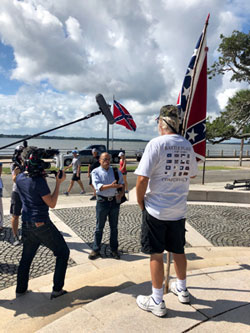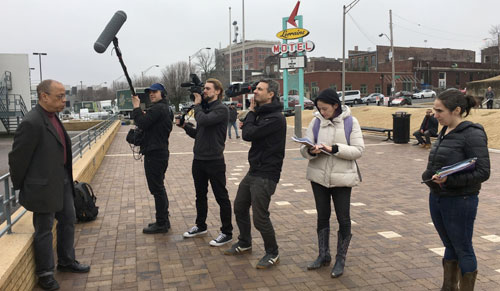|
How does one keep a young black male safe in America?
In 2011, Jeffrey Robinson asked this question when he became a father to his orphaned nephew. Robinson's father took him at age eleven to a
demonstration by the sanitation workers in their hometown of Memphis, Tennessee. That was the protest associated with the assassination of Martin Luther King. Ever since that
time, Robinson has been aware that black men and boys are frequently killed without provocation by American police and, worse, without accountability before the law. Larry
Payne (1950-1968), an 18-year-old Black boy, was killed that day and Robinson states he began to realize how lucky he was.
On the premise that knowledge is power, Robinson, a retired trial lawyer, graduate of Harvard Law School, and former ACLU Deputy Legal
Director, pieced together a talk about the false narrative white supremacists tell, that feeds Black racism in America. Over a ten-year period, he has presented what he learned
in his talks at community centers, churches, concert halls, and conference rooms. His goal? To raise awareness and to strive for changing opinions and, most importantly,
behavior.

In 2017, two white women from a prominent activist family—Emily and
Sarah Kunstler contacted Robinson and offered to make a film to elevate his effort to a national level. They gave him all the rights to the film and
final editorial control of the film's content. They built trust and convinced him that his personal story needed to be part of the overall story told.
Who We Are—A Chronicle of Racism in America launched January 14,
2022, in theaters in New York and Los Angeles. Robinson anchors the film at New York City's Town Hall before a live audience. In between facts and
charts presented on stage, the Kunstler sisters insert scenes made from a cross-country trip in a 15-person van with Robinson, his wife, his brother,
architect Carmen Valdes, their mother—civil rights attorney Margaret Ratner Kunstler, their older sister—former Freedom Summer participant
and attorney Karin Kunstler Goldman, and Emily Kunstler's 10-year-old daughter.

Some of the people who view this powerful 118-minute film may be familiar with footage drawn from archives of the 1968 assassination of
Martin Luther King, the 1921 massacre and fire-bombing of the thriving Tulsa Greenwood community, the 1965 Alabama police beatings on the
Edmund Pettus Bridge of peaceful demonstrators marching for voting rights, the 2014 police killing of Eric Garner who cried out "I can't breathe
," and many other tragic events involving violence against Black people. However, this film presents many instances of new material. We learn
about slave fingerprints pressed into the mortar between bricks of buildings constructed by slaves in Charleston, SC.  Robinson talks to
Braxton Spivey (he gets a credit in the film), Chairman of the pro-Confederate flag group who stands every Sunday in front of a Civil War
memorial in Charleston and who tells Robinson the Civil War was fought because of money—that the North was overtaxing Southern crops.
Robinson then clarifies whether the man means cotton, rice, and tobacco, crops all produced with slave labor. The affirmation leads to Robinson's
next question about whether slavery was a good thing and the man answers, no it wasn't but the slaves were treated like family. Robinson rejoins, would you be satisfied being a slave? With
difficulty, the man answers no. We also hear a chorus sing the third verse of "The Star-Spangled Banner" which has these words: Robinson talks to
Braxton Spivey (he gets a credit in the film), Chairman of the pro-Confederate flag group who stands every Sunday in front of a Civil War
memorial in Charleston and who tells Robinson the Civil War was fought because of money—that the North was overtaxing Southern crops.
Robinson then clarifies whether the man means cotton, rice, and tobacco, crops all produced with slave labor. The affirmation leads to Robinson's
next question about whether slavery was a good thing and the man answers, no it wasn't but the slaves were treated like family. Robinson rejoins, would you be satisfied being a slave? With
difficulty, the man answers no. We also hear a chorus sing the third verse of "The Star-Spangled Banner" which has these words:
"No refuge could save the hireling or slave from the terror of flight or the gloom of the grave."
What Francis Scott Key, a slave owner, was referring to was that the British were not only hiring mercenaries to fight against the American
revolutionaries but also, they promised American slaves freedom, and possibly revenge, if they fought with the British.
One of the points Robinson is making is that racism pervades the American
experience in so many, and often unexpected, ways. He mentions that even he was rated prejudiced against Black people when he took Harvard
University's Implicit Association Test on racism.

By the end of the film, Robinson has revealed much about himself,
including that he believes he was lucky that his family was able to move to a neighborhood where he and his siblings were able to attend good schools.
The neighborhood was white, and he and his brother were the only Black children within their school. We meet one of his white classmates and their
white basketball coach. Robinson hears stories for the first time about ways they protected him from racial prejudice. We see firsthand the tears he
tries to suppress and then wipes away.
Robinson closes by saying we are at a tipping point now just like we were when King was assassinated. The question is what are we going to do to
change attitudes in America? Yes, we can engage men like Braxton Spivey and hear them say slavery was bad and no, he would not want to live as
Jeff Robinson's slave even if Robinson treated him as family, but how far does that attitude go in keeping Robinson's teenage son safe?
Who We Are—A Chronicle of Racism in America gives Americans a lot to
think about. The hope is that this film will move people to recognize their own shortcomings. A great deal of important and difficult work remains.
|